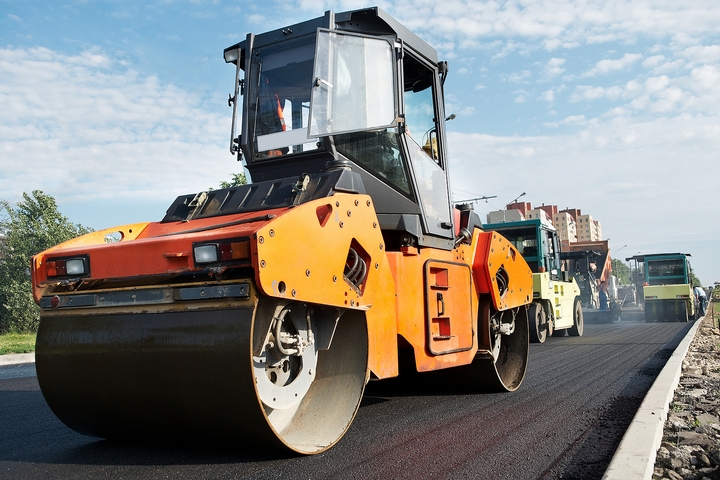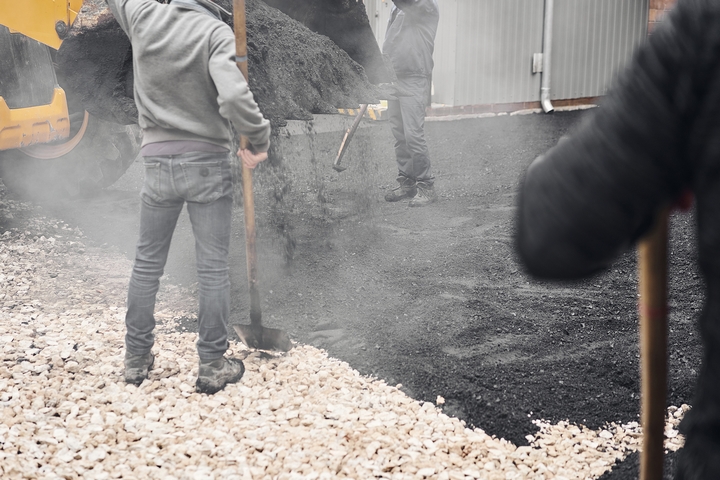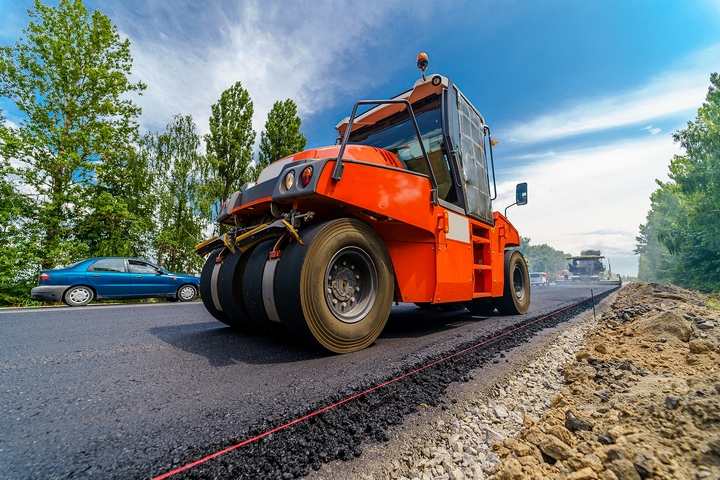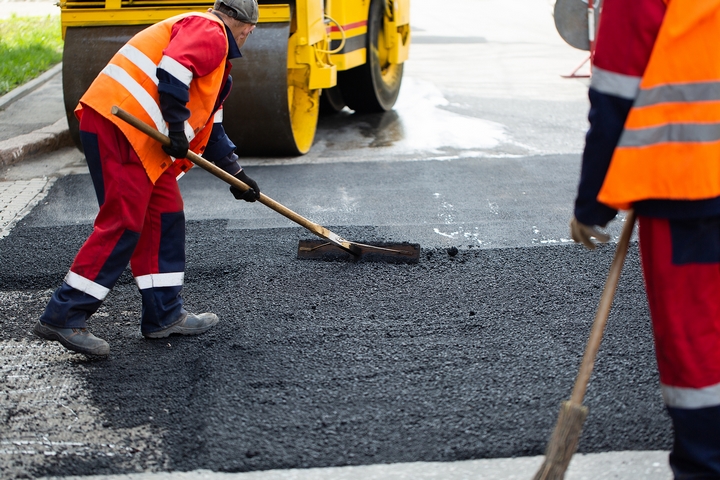Great curb appeal begins with asphalt pavement. Using asphalt for the construction and maintenance of roads is beneficial for both the environment and road users.
Asphalt road surfaces offer comfort, reduced noise pollution, and cost efficiency, just to mention a few advantages. Furthermore, production and construction require 20% less energy compared to other pavement materials.
The following are eight advantages of asphalt roads:
Advantage #1: Asphalt Is Smooth
 Asphalt gives road users a consistent, smooth, and quiet ride. It can be described as a flexible pavement, which is built in multiple layers using a continuous flow of material passing through the asphalt paver. This method of construction eliminates blow-ups, noisy surface textures, and repetitive construction joints. It also results in low-rolling resistance, which gives drivers a smooth, quiet ride.
Asphalt gives road users a consistent, smooth, and quiet ride. It can be described as a flexible pavement, which is built in multiple layers using a continuous flow of material passing through the asphalt paver. This method of construction eliminates blow-ups, noisy surface textures, and repetitive construction joints. It also results in low-rolling resistance, which gives drivers a smooth, quiet ride.
Asphalt roads reduce carbon emissions and fuel consumption by 5%. For airports, this means safer take-offs and landings since they’re smooth and easy to maintain.
Advantage #2: Asphalt Roads Can Be Constructed Quickly
 An advantage of asphalt roads is that they can be constructed quite quickly. They don’t need much cure time, meaning motorists can use roadways immediately after the last roller leaves. This results in safer roads and fewer delays for the travelling public.
An advantage of asphalt roads is that they can be constructed quite quickly. They don’t need much cure time, meaning motorists can use roadways immediately after the last roller leaves. This results in safer roads and fewer delays for the travelling public.
When the traffic volume rises, asphalt roads can be upgraded by simply applying an overlay, instead of reconstructing them. The flexibility of their application means asphalt roads can be partly opened as they’re being upgraded.
Advantage #3: Asphalt Is Cost-Efficient
 Asphalt roads attract a low initial cost, a residual value higher than other pavements due to its recyclability. Besides, asphalt also lasts a long time. Reclaimed asphalt contains high levels of bitumen, which is the most expensive component in asphalt.
Asphalt roads attract a low initial cost, a residual value higher than other pavements due to its recyclability. Besides, asphalt also lasts a long time. Reclaimed asphalt contains high levels of bitumen, which is the most expensive component in asphalt.
Reheating and reusing it is simple, making it a valuable raw material. Reusing reclaimed asphalt results in considerable savings, especially if transportation distances are reasonably short.
Asphalt made using new materials, and from reclaimed asphalt, have the same quality requirements, making reused asphalt just as durable and as clean as new asphalt. This material is also cost-efficient in terms of the duration it takes to construct the road.
It’s easy and quick to use, saving the public, contractors, and governments both time and money. Since asphalt pavements have no joints, they aren’t affected by freeze-thaw actions, either, which makes them less expensive to maintain.
Advantage #4: Asphalt Is up to 100% Reusable
 Asphalt is a commonly recycled construction product, rendering roads made using this material sustainable. Making a road from 100% reclaimed asphalt is quite possible. At an asphalt plant, the reclaimed asphalt is crushed and the resulting granules reused as new asphalt.
Asphalt is a commonly recycled construction product, rendering roads made using this material sustainable. Making a road from 100% reclaimed asphalt is quite possible. At an asphalt plant, the reclaimed asphalt is crushed and the resulting granules reused as new asphalt.
Many asphalt plants are equipped with the tools to reuse reclaimed asphalt. Since the seventies, reusing old asphalt has gained popularity. Today, large-scale recycling is possible due to heavy investments in new machinery. From an environmental and economic standpoint, it’s beneficial to reuse recycled asphalt as a raw material for new roads.
Recycling asphalt lowers CO2 emissions and energy costs, making it an economically, environmentally and industrially important goal. Post-consumer waste such as used shingles and tires can be reused on new asphalt pavements.
Advantage #5: Asphalt Is Safe
 Modern asphalt technology ensures rapid drainage and dispersal of surface water; this reduces water spray and improves visibility for drivers in wet conditions. Asphalt contains porous materials that dramatically reduce blinding spray and the risk of aquaplaning as well. It also increases the visibility of road markings.
Modern asphalt technology ensures rapid drainage and dispersal of surface water; this reduces water spray and improves visibility for drivers in wet conditions. Asphalt contains porous materials that dramatically reduce blinding spray and the risk of aquaplaning as well. It also increases the visibility of road markings.
There is a wide variety of asphalt mixtures in the market offering specifiers with a solution for all the different types of weather and road conditions. This maximizes safety for the driving public. Also available are mixtures designed with high skid-resistance, which is great for areas prone to hard braking.
Further, because the construction of asphalt roads is quick, the safety risk for both the workers and road users is significantly reduced.
Advantage #6: Asphalt Is Flexible
 Asphalt roads can be tailor-made to support the climatic conditions and traffic load of a specific area. There are special asphalt solutions for rural, suburban, and urban roads. The flexibility of this material is particularly useful for coping with the stress of large traffic loads on a bridge. In areas where roads experience frequent freezing and thawing, asphalt surfaces can be modified to handle the extreme temperature cycles, thanks to bitumen’s elasticity.
Asphalt roads can be tailor-made to support the climatic conditions and traffic load of a specific area. There are special asphalt solutions for rural, suburban, and urban roads. The flexibility of this material is particularly useful for coping with the stress of large traffic loads on a bridge. In areas where roads experience frequent freezing and thawing, asphalt surfaces can be modified to handle the extreme temperature cycles, thanks to bitumen’s elasticity.
For roads with light traffic, layers can be thinner. The adaptability of asphalt is a solution to the changing requirements of the road user. The building and maintenance of technical infrastructures like water pipes and district heating, communication and electrical cables, and sewage, require the paving to be opened up. With asphalt, pavement can be opened and quickly reinstalled.
Advantage #7: Asphalt Is Durable
 Asphalt roads can be built to last indefinitely. They’re often constructed using thick base courses that bear the main load above the unbound granular layer. A binder course is then placed over the base course, followed by a 30-40mm surface course.
Asphalt roads can be built to last indefinitely. They’re often constructed using thick base courses that bear the main load above the unbound granular layer. A binder course is then placed over the base course, followed by a 30-40mm surface course.
Intermediate and base courses that are properly designed, constructed, and maintained remain viable for many decades without needing total reconstruction. On modern roads, self-healing asphalts significantly extend the service life of wearing courses. When the roads do deteriorate over time, asphalt resurfacing is a commonly used maintenance technique. This method restores the condition of the road to its original appearance.
Advantage #8: Asphalt Reduces Noise
 Asphalt roads significantly reduce noise inside and outside a driver’s car. This helps to prevent accidents by removing a source of stress that’s a major contributor to driver fatigue. Compared to other traditional road surfaces, asphalt roads have the lowest noise levels. The development of silent and porous asphalt reduces noise levels even further.
Asphalt roads significantly reduce noise inside and outside a driver’s car. This helps to prevent accidents by removing a source of stress that’s a major contributor to driver fatigue. Compared to other traditional road surfaces, asphalt roads have the lowest noise levels. The development of silent and porous asphalt reduces noise levels even further.




